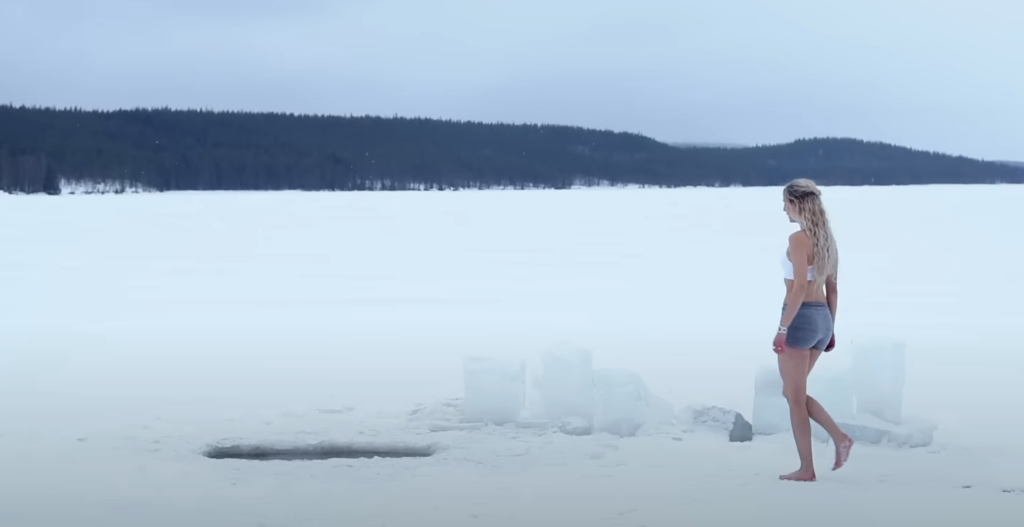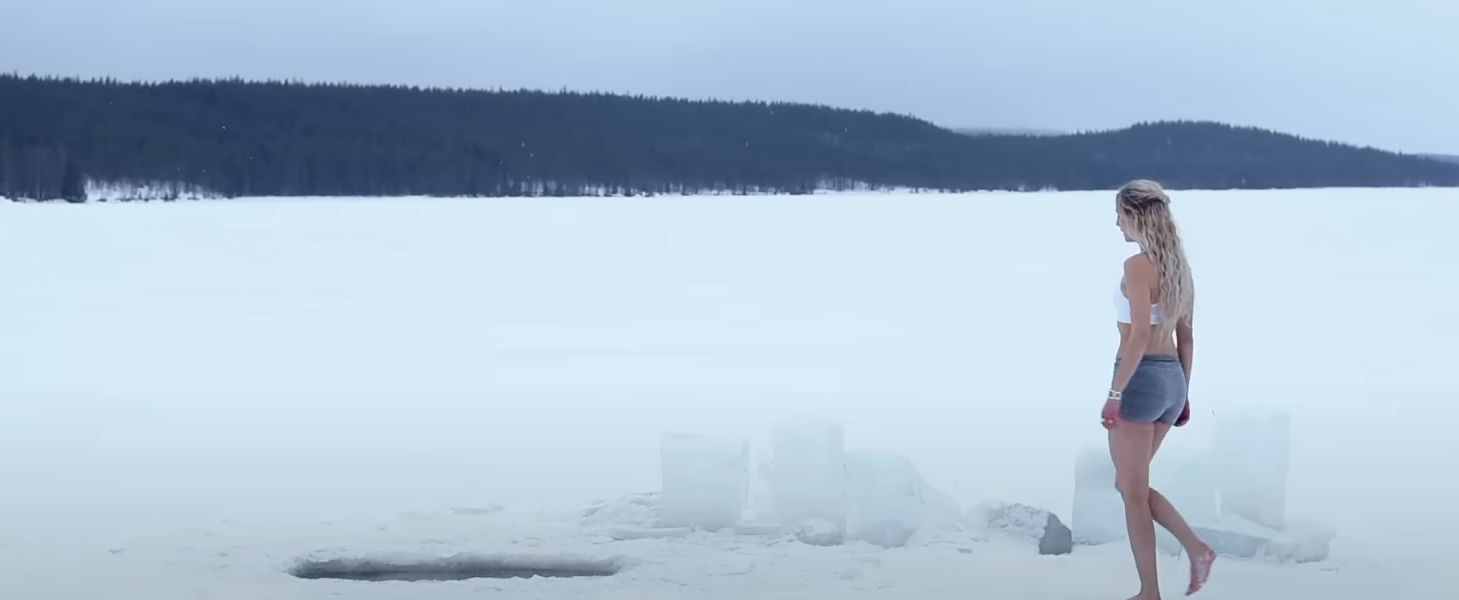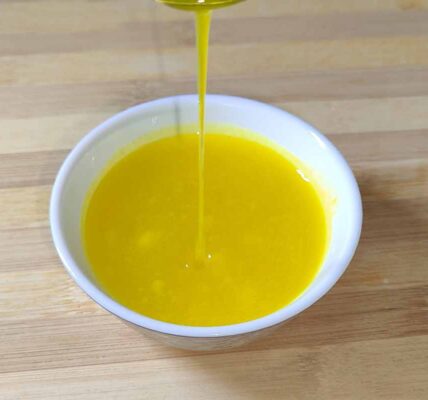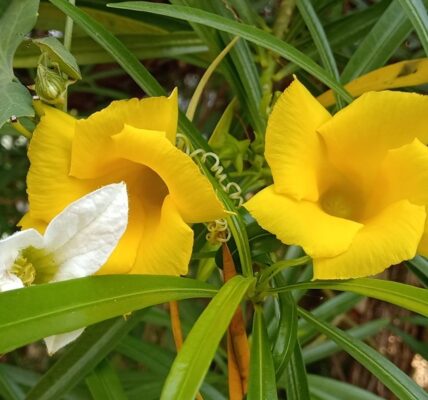A young girl named Jonna Jinton has found solace in an unexpected remedy: the ice bath, astonishingly taking place in the remote northern reaches of Sweden, where winter nights are long, icy cold, and sunlight is a rare commodity. In a region where the sun disappears for months on end, plunging residents into a state of perpetual darkness, coping with stress and depression becomes a daunting challenge. However, for one resilient individual, the answer lies in the chilling embrace of an ice bath.
Jonna Jinton’s unique approach to mental well-being involves more than just a plunge into icy waters; it’s rooted in the growing field of cold therapy and its impact on the mind and body. Scientific studies have explored the benefits of cold exposure, shedding light on the physiological and psychological changes that occur when the body encounters extreme cold.
The Science Behind Ice Baths:
Physiologically, cold exposure triggers the release of endorphins, the body’s natural stress relievers. A study published in the “Journal of Clinical Endocrinology & Metabolism” (Dinas et al., 2013) found that cold exposure significantly increased plasma levels of beta-endorphins, providing a neurochemical basis for the mood-enhancing effects reported by individuals like Jonna Jinton.
Furthermore, cold exposure has been linked to increased brown adipose tissue (BAT) activation. Brown fat, as opposed to white fat, plays a role in energy expenditure and thermogenesis. A study published in the “New England Journal of Medicine” (Cypess et al., 2009) demonstrated that exposure to cold temperatures activates brown fat, contributing to increased energy expenditure and potential weight loss.
Jonna Jinton’s ritual of immersing herself in freezing waters also aligns with research on the benefits of cold-water swimming. A study published in the “International Journal of Circumpolar Health” (Huttunen & Kokko, 2016) explored the physiological and psychological effects of winter swimming, revealing that regular exposure to cold water positively impacted mood and reduced symptoms of anxiety and depression.
The mental fortitude gained through Jonna Jinton’s ice bath practice is not mere anecdotal evidence. Cold exposure has been shown to activate the sympathetic nervous system, leading to increased alertness and a heightened state of arousal. A study published in the “European Journal of Applied Physiology” (Foster et al., 1998) found that cold water immersion stimulated the release of norepinephrine, a neurotransmitter associated with attention and vigilance.
Beyond Physiology: A Holistic Remedy:
However, Jonna Jinton’s experience goes beyond the physiological benefits. For her, the ice bath is a holistic remedy that addresses both the mind and body. In a place where daylight is a precious commodity during the winter months, she turns to the icy waters as a source of rejuvenation and a means to navigate the mental challenges brought on by the prolonged darkness.
The symbolism inherent in Jonna Jinton’s ice bath practice, representing a journey from darkness to light, is reinforced by research on the psychological benefits of contrasting temperatures. A study published in “Frontiers in Psychology” (van der Does et al., 2020) explored the impact of temperature contrast on mood, suggesting that exposure to cold temperatures followed by warmth could have a positive effect on emotional well-being.
Winter Nights and the Arctic Darkness:

In Northern Sweden, the winters are harsh, and the nights seem to stretch on endlessly. The phenomenon known as the polar night engulfs the region, leaving its inhabitants grappling with a lack of sunlight and the psychological toll it can take. Enter Jonna Jinton, a young woman from a small village in the heart of this frigid landscape, who has discovered an unconventional yet surprisingly effective method for combating stress and depression: the ice bath.
While the ice bath may not be a universal remedy for everyone, Jonna Jinton’s story is a compelling testament to the transformative power of cold therapy. As our understanding of the mind-body connection continues to evolve, unconventional practices like ice baths may find a place in the toolkit for mental health and stress management.
A Symbolic Journey:
The mental discipline required to face the intense cold head-on mirrors the resilience needed to confront the emotional challenges that come with the extended periods of darkness. The ice bath becomes a metaphorical journey from darkness to light, a tangible representation of overcoming adversity and finding strength within oneself.
As she emerges from the frigid waters, Jonna Jinton carries with her a renewed sense of vitality, a testament to the therapeutic potential that lies within the depths of the Arctic chill. In a world that often seeks quick fixes and instant gratification, Sara’s embrace of the ice bath highlights the transformative power of patience and endurance.
In the midst of the Arctic darkness, Jonna Jinton has found a source of empowerment and resilience in the depths of icy waters beneath the endless northern sky. Her story serves as a reminder that sometimes, the most effective solutions to our struggles may lie in the unexplored territories – even in the embrace of the chilling Arctic chill.
Whether it’s the neurochemical response to cold exposure, the activation of brown adipose tissue, or the psychological impact of temperature contrast, Jonna Jinton’s journey into the ice bath unveils a multidimensional approach to well-being. The merging of ancient practices and modern scientific understanding paints a picture of the potential benefits that lie in the intersection of tradition and innovation, reminding us that healing can often be found in the most unexpected places.




